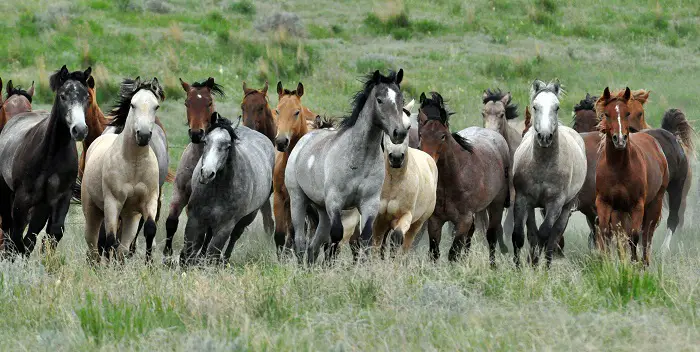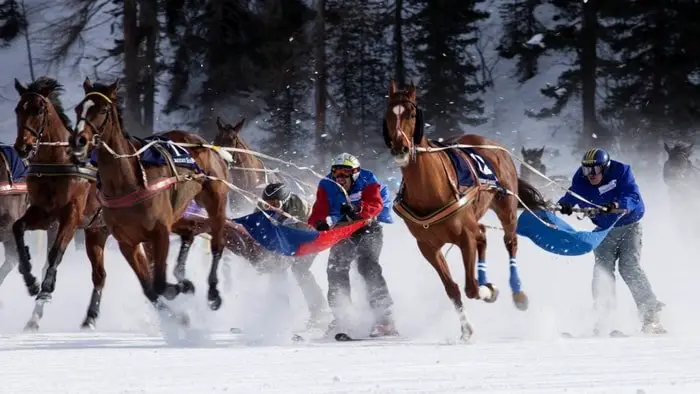The equine industry refers to all activities and businesses related to horses. This includes horse breeding, training, racing, showing, and recreational riding. The horse industry also includes businesses that provide services for horses and their owners, such as veterinary care, farriers (horseshoeing), feed and tack suppliers, and transportation services.
Additionally, the equine industry encompasses research and educational institutions focused on the care and management of horses. The equine industry significantly contributes to many countries’ economies, providing jobs and generating revenue through horse-related activities and businesses.
Economic Impact of the Horse Industry
The horse industry has a significant economic impact on many countries worldwide. Here are some of how the industry contributes to the economy:
- Job creation: The horse industry provides jobs for many people, including trainers, jockeys, breeders, veterinarians, farriers, and support staff.
- Revenue generation: The industry generates revenue through various activities such as horse racing, breeding, sales, and recreational riding.
- Tourism: Many horse-related events, such as races and horse shows, attract visitors from all over the world, contributing to the local economy through tourism.
- Tax revenue: The industry generates tax revenue through sales, property, and income taxes.
- Infrastructure development: The industry drives the development of infrastructure such as racecourses, stables, and equestrian centers, which in turn creates jobs and generates revenue.
According to a study by the American Horse Council, the horse industry contributes $50 billion annually to the US economy and supports approximately 1.4 million jobs. Similarly, the horse industry generates £4.3 billion in the UK and supports 120,000 jobs. Overall, the equine industry is an essential contributor to many economies worldwide.
Laws and Lobbying about Horse Industry
The horse industry is regulated by various laws and regulations at the national, state/provincial, and local levels. These laws cover animal welfare, transportation, racing, and breeding areas.
Animal welfare is a critical concern for the horse industry, and strict laws are in place to ensure that horses are treated humanely. These laws include regulations for horse care, handling, and transportation. In the United States, the Animal Welfare Act and the Horse Protection Act are two significant laws that govern the welfare of horses.
The horse racing industry is also heavily regulated, with laws and regulations covering areas such as drug use, track safety, and racehorse retirement. In the United States, the Interstate Horseracing Act and the Horseracing Integrity and Safety Act are two significant pieces of legislation that regulate the horse racing industry.
Lobbying is also an essential aspect of the equine industry. Organizations such as the American Horse Council and the British Horse Society lobby on behalf of the industry to ensure that laws and regulations are fair and reasonable. These organizations also work to promote the interests of the equine industry and educate policymakers about horses’ economic and cultural significance.
Overall, the equine industry is subject to many laws and regulations, and lobbying plays a crucial role in shaping these laws and regulations to support the industry’s interests.
Present Status of Equine Industry in the World
The present status of the equine industry varies around the world. Here are some trends and developments in the industry:
- Economic impact: The equine industry contributes significantly to many countries’ economies, generating revenue and creating jobs through various activities such as horse racing, breeding, sales, and recreational riding.
- Technology: Technology is increasingly used in the equine industry, with innovations such as wearable equine technology, genetic testing, and precision nutrition.
- Sustainability: There is growing interested in promoting sustainability in the equine industry, focusing on reducing waste, increasing efficiency, and using environmentally friendly practices.
- Animal welfare: Animal welfare remains a critical concern for the equine industry, and there are ongoing efforts to ensure that horses are treated humanely throughout their lives.
- COVID-19 pandemic: The COVID-19 pandemic has affected the equine industry worldwide, with many events and activities being canceled or postponed due to health and safety concerns.
Overall, the equine industry continues to evolve, with new technologies and practices being adopted to improve efficiency and sustainability while focusing on animal welfare. Despite the challenges posed by the COVID-19 pandemic, the industry remains a significant contributor to many countries’ economies and a vital part of many cultures and traditions.
Equine Industry in the United States of America
The equine industry significantly contributes to the US economy, generating billions of dollars in revenue and supporting millions of jobs. Here are some critical facts about the equine industry in the USA:
- Economic Impact: The equine industry contributes approximately $50 billion annually to the US economy and supports about 1.4 million jobs.
- Horse Racing: Horse racing is a significant part of the equine industry in the USA, with the annual Kentucky Derby being one of the most significant events in the industry. There are over 100 racetracks in the USA, with over $11 billion annually wagering.
- Recreation: Recreational riding is also an essential part of the equine industry in the USA, with over 4.6 million people participating in horse-related activities.
- Breeding: The USA is a significant player in the global horse breeding industry, with many high-quality horses bred and raised in the country.
- Regulations: The equine industry in the USA is subject to many regulations covering areas such as animal welfare, racing, and breeding. The USDA and state-level regulatory bodies are responsible for enforcing these regulations.
Overall, the equine industry is an integral part of the US economy and cultural heritage, with a long history of horsemanship and breeding excellence. The industry faces ongoing challenges related to animal welfare, regulatory compliance, and competition from other forms of entertainment. Still, it continues to adapt and evolve to remain a vital part of American life.
Horse Industry in Europe
The European equine industry is a diverse and thriving sector, with many activities and disciplines contributing to its success. Here are some critical facts about the industry in Europe:
- Economic Impact: The equine industry contributes over €100 billion annually to the European economy and supports over one million jobs.
- Sports: Equestrian sports are an essential part of the European equine industry, with disciplines such as dressage, show jumping, and eventing attracting large audiences and significant investment.
- Breeding: Europe is a world leader in horse breeding, with many high-quality horses bred and raised in countries such as Germany, France, and the Netherlands.
- Tourism: Horse-related tourism is a growing sector in Europe, with many countries offering equestrian vacations and tours.
- Regulations: The European horse industry is subject to various regulations covering animal welfare, transport, and racing. The European Union sets many of these regulations, which are then enforced by national authorities.
Overall, the horse industry in Europe is a vibrant and diverse sector, with many different activities and disciplines contributing to its success. The industry faces ongoing challenges in animal welfare, environmental sustainability, and regulatory compliance. Still, it continues to evolve and adapt to remain a vital part of European culture and economy.
Horse Racing Industry and Present Days
The racing industry refers to the various horse breeding, training, racing, and wagering activities, typically Thoroughbreds, Standardbreds, Quarter Horses, or Arabians. It is a popular spectator sport and a significant contributor to many countries’ economies worldwide.
The industry primarily focuses on horse racing, where horses compete against each other in races of varying distances and conditions. These races can occur on tracks, turf courses, or other specially designed-courses. The industry also includes horse training, veterinary care, breeding, and the buying and selling of horses.
In many countries, horse racing is heavily regulated, with organizations overseeing the safety and welfare of the horses and the integrity of the races. The industry also generates significant revenue through betting and other forms of gambling, with millions of dollars often wagered on significant races such as the Kentucky Derby, the Melbourne Cup, and the Dubai World Cup.





